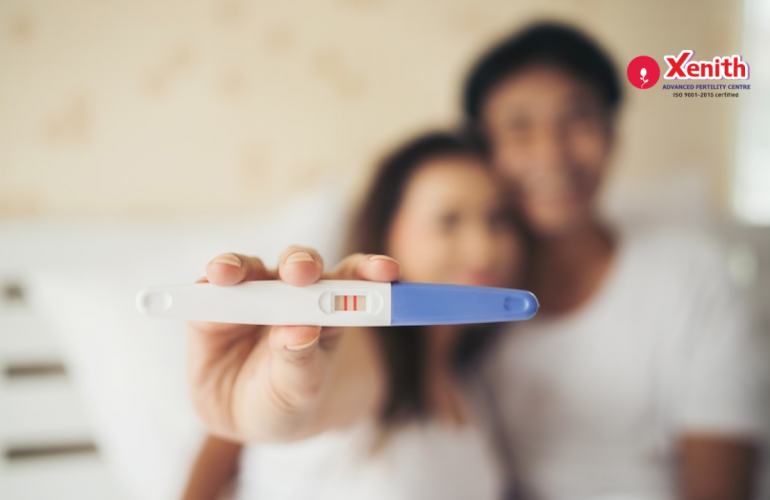Miscarriage is the loss of pregnancy before the 20th week and it can be a traumatic time in your life In many circumstances there might not be any reason for its occurrence, making it very hard to cope with the waves of sadness interspersed with the question of why it happened and feelings of guilt. Miscarriages are quite common even in healthy women and its almost never caused by something the person did. A miscarriage usually happens in the earlier part of the pregnancy because 80% of the miscarriages happen in the first 3 months. (1) However, most women who have had a miscarriage go on to have a normal pregnancy after that. Sometimes, a woman can have a miscarriage in the first week or two without even realizing she’s pregnant and it may seem like period just came late.
Symptoms of a miscarriage might include bleeding, severe cramps, belly and or back pain, fever, contractions, blood clots passing from your vagina amongst other signs.

Free Thursday Consultation
Book Your AppointmentCause of miscarriage
- Genetic or chromosomal abnormality- Each person has 46 chromosomes and if something goes wrong randomly when the cells are dividing leading to missing or repeated chromosomes, it can cause a miscarriage. About 50 percent of all first trimester miscarriages are because of chromosomal abnormalities. (2) This happens more often as the woman gets older.
- Certain illnesses- like severe diabetes, thyroid problems, heart disease, hypertension are just some of the illnesses that may lead to miscarriage. Clotting disorders like lupus can form clots in the placenta preventing much needed nutrition from reaching the baby and waste to be taken away.
- Certain infections- like herpes, listeria and rubella can pass through the placenta to the fetus and harm it. Other infections of the uterus or cervix could also cause miscarriage.
- Defects in the structure of the uterus cavity or cervix as well as presence of fibroids- may lead to an inability to go through a healthy pregnancy. Sometimes a weak cervix, which is also called cervical insufficiency, cannot hold the pregnancy and this usually occurs in the second trimester.
- Major injury- A fall in the first trimester most probably will not lead to a miscarriage because the uterus wall is still thick and the pelvic bones will protect the tiny embryo. In the second trimester, a lot of amniotic fluid surrounding the fetus could also provide protection. Very major impacts which is a rare happening can lead to a miscarriage.
- Age- The rate of miscarriage is high in women in their late 30s or older. (3)
- Lifestyle choices- like smoking, drinking alcohol, using street drugs or being exposed to radiation or toxic substances.
- Medications– certain medications like certain antibiotics, steroids, retinoids used for treating severe acne, as well as medications for rheumatoid arthritis are just some medications that may increase your risk of miscarriage. Always consult with your doctor before taking any medications.
- If you have had 2 or more miscarriages in a row- you are more likely to have another miscarriage. Your doctor might recommend doing some blood tests, chromosome tests, ultrasound to see if there are any issues with the uterus, pelvic exam or various other tests to see if there are any reasons for your miscarriages. It could also be due to an autoimmune response. (4)
Myths about miscarriage:
- Sudden shock or fright during pregnancy doesn’t cause miscarriage.
- Minor injuries don’t lead to miscarriage.
- Exercise- during pregnancy is not linked to miscarriage. In fact, it is better to stay active during pregnancy to decrease the chances of gestational diabetes or having high blood pressure. Have a discussion with your doctor if you want to do some high intensity exercise.
- Straining or lifting do not increase risk of miscarriage.
- Being emotional or getting stressed is not linked to higher risk of a miscarriage. Mood changes during pregnancy can happen due to fatigue, or changes in hormone levels.
- Working during pregnancy is not associated with increased risk of miscarriage although make sure you aren’t exposed to radiation or certain chemicals at work.
- Having sex during pregnancy cannot lead to a miscarriage as long as you don’t have any preexisting conditions like placenta previa or preterm labor
- Air travel is considered safe during pregnancy although many airlines don’t allow travel after the 36th week of pregnancy.
- Eating hot and spicy food does not lead to a miscarriage.
- You should wait for some time preferably 2- 3 months before trying to get pregnant again. However depending on how early the miscarriage happened, you could start trying as soon as after your first period. But consult with your doctor as to your physical and mental health before trying again.
If you have had an early miscarriage, get in touch with your doctor before planning your next pregnancy. If during the pregnancy you have severe pain or heavy bleeding, it could be a sign of threatened miscarriage, so consult your doctor immediately. At times if after the miscarriage heavy bleeding with or without passage of clots continues the doctor might need to remove any remaining fetal tissue in the uterus. You might also be given medication to speed up the removal of any tissue. The doctor might also do a follow up by asking you to do some blood tests and ultrasound to be sure no tissue from the pregnancy remains in your body.
A single miscarriage can happen in 15% of pregnant women and usually a lot of work up is not necessary after a single miscarriage, though after two miscarriages a thorough workup is indicated. Try to stay positive and focus on your physical and emotional health. You could lead a healthy lifestyle like eating healthy foods, avoiding smoking and drinking alcohol. Getting moderate exercise can definitely help keep your body and mind healthy. If you do get pregnant, get regular prenatal checkups from your doctor. You might experience a range of emotions following a miscarriage and its absolutely okay to feel this way. It might help to talk to your partner, close friend, family or a professional counselor or joining a support group to vent your feelings and know that it’s not your fault. Take time to heal physically and emotionally before trying again. There is nothing to be ashamed about since it’s not your fault. Everyone heals differently and make sure you take your time to decide what to do next. Talk to your doctor as well about your next steps. If you have experienced one or several miscarriages, come talk to us at Xenith Advanced Fertility Centre and we can help you have a successful pregnancy outcome.




